
Yesterday it was announced that the Duke of Edinburgh had died at the age of 99.
Many quickly started to speculate if there would be a Bank Holiday if events would be cancelled and more.
Following the death of the Duke, here's what happens next.
There will be no lying in state and no state funeral for Philip, in accordance with his wishes.
His ceremonial royal funeral and burial are expected to take place in St George’s Chapel at Windsor Castle.
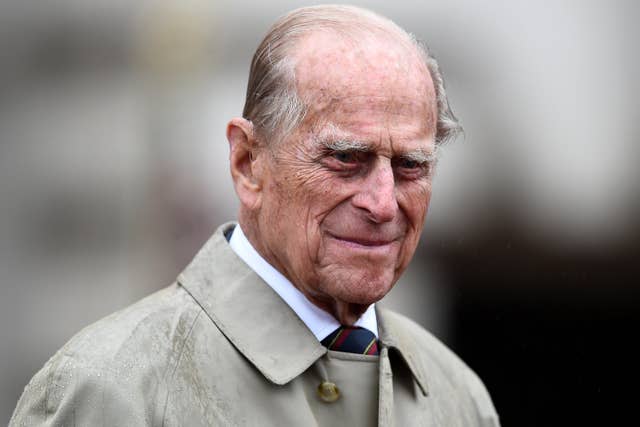 The Duke of Edinburgh insisted he did not want to lie in state (Hannah McKay/PA)
The Duke of Edinburgh insisted he did not want to lie in state (Hannah McKay/PA)
But the coronavirus pandemic – with the ban on mass gatherings and England in national lockdown – means the exact plans for the aftermath of Philip’s death have had to change, with public elements removed to prevent crowds gathering.
Flags are already flying at half mast on UK Government buildings in tribute to the duke and will do so until the morning after his funeral.
Members of the public have been asked not to gather at royal residences nor to leave floral tributes – but to donate to charity instead.
– The funeral
The details of Philip’s televised funeral are expected to be officially announced this weekend, with Buckingham Palace aides having to consider how it should be handled during the worst public health crisis for generations.
The Queen has final approval over the plans – codenamed Forth Bridge – and will be considering the amended arrangements.
The date has yet to be confirmed, but originally, the funeral was due to be staged eight days after Philip’s death, which would be April 17 – just four days before the Queen’s 95th birthday on April 21.
The duke’s children and older grandchildren were likely to have walked through the streets behind the coffin, similar to the processions for the funerals of Diana, Princess of Wales, and the Queen Mother – but anything with the potential to draw a crowd will no longer take place.
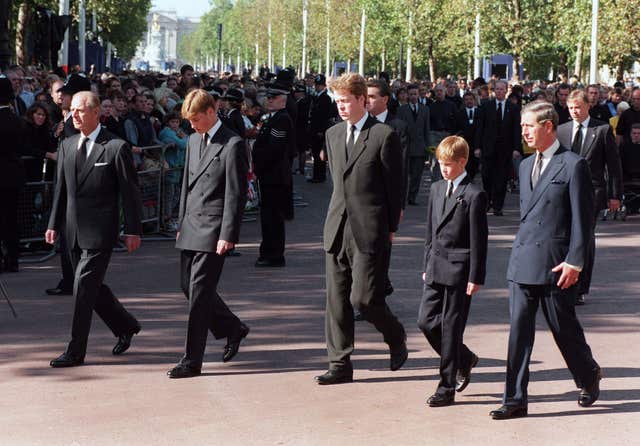 The Duke of Edinburgh, Prince William, Earl Spencer, Prince Harry and the Prince of Wales walking behind the coffin of Diana, Princess of Wales (Tony Harris/PA)
The Duke of Edinburgh, Prince William, Earl Spencer, Prince Harry and the Prince of Wales walking behind the coffin of Diana, Princess of Wales (Tony Harris/PA)
The Lord Chamberlain, Baron Parker of Minsmere, will oversee the long-held master plan and the days leading up to it, with the Lord Chamberlain’s Office, headed by the Queen’s Comptroller, setting in motion the carefully orchestrated programme of events.
Philip helped draw up the original details himself and was determined there should be a minimum of fuss.
Behind the scenes, aides and household staff will be busy putting the plans in place.
– Who will attend
Only 30 people – in addition to the clergy – will be allowed to attend Philip’s funeral.
It was originally planned for 800 guests, but will now have to take into account the strict limit on numbers during the pandemic.
The Queen will have to decide which family members to invite.
The Duke of Sussex is likely to travel back from the US to attend.
Gun salutes
Gun salutes marking Philip’s death will take place across the UK, in Gibraltar and at sea on Saturday.
READ MORE: Prince Philip: Papers around the world react to the death of Duke of Edinburgh
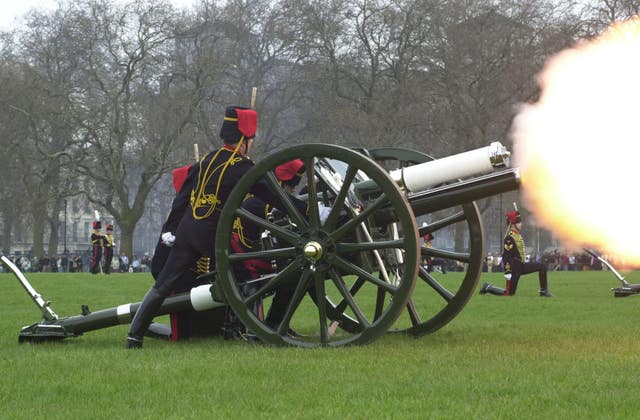 Gun salutes following the death of the Queen Mother in 2002 (Army/PA)
Gun salutes following the death of the Queen Mother in 2002 (Army/PA)
Saluting batteries will fire 41 rounds at one round every minute from midday in cities including London, Edinburgh, Cardiff and Belfast, as well as Gibraltar and from Royal Navy warships, the Ministry of Defence said.
– Royal Family’s Mourning
The Queen also has to decide whether the royal family will enter Court Mourning – dressing in black and using black-edged writing paper – or the alternative, shorter Family Mourning – dressing in black – and how long this will last.
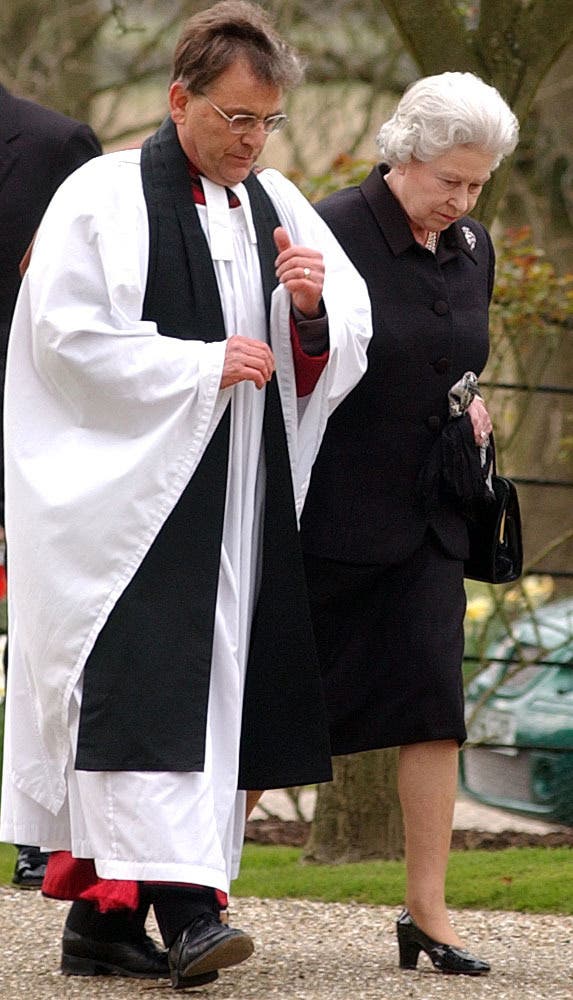 The Queen in mourning dress following the death of the Queen Mother (Kirsty Wigglesworth/PA)
The Queen in mourning dress following the death of the Queen Mother (Kirsty Wigglesworth/PA)
Some official engagements may continue, but social engagements – most on hold anyway because of the pandemic – are usually cancelled after the death of a senior member of the royal family unless in aid of charity.
Family Mourning for the Queen Mother in 2002 lasted three weeks.
– National Mourning
The Government decides on the length of any National Mourning, which usually lasts until the day after the funeral.
A nationwide two-minute silence could take place, as it did for the Queen Mother on the day of her funeral.
READ MORE: Prince Philip Death: Will there be a bank holiday and state funeral?
– Parliament
The Scottish Parliament will be recalled on Monday following the death of Prince Philip, it has been announced.
Holyrood broke up at the end of last month ahead of the election on May 6.
In Westminster, Parliament is being recalled from its Easter recess to allow MPs and peers to pay tribute to the duke.
READ MORE: Scottish Parliament to be recalled following death of Prince Philip
Downing Street and parliamentary officials confirmed the move to reconvene the House of Commons on Monday, a day earlier than scheduled.
The House of Commons is expected to meet from 2.30pm on Monday.
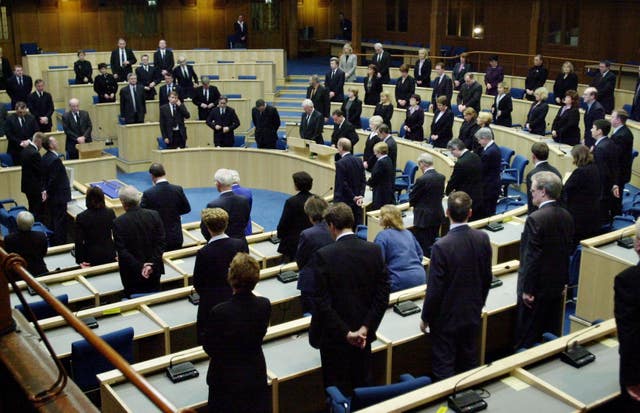 Members of the Scottish Parliament in Edinburgh stand in silence in honour of the Queen Mother in 2002 (David Cheskin/PA)
Members of the Scottish Parliament in Edinburgh stand in silence in honour of the Queen Mother in 2002 (David Cheskin/PA)
– Queen may address the nation
The Queen may record a televised speech in tribute to her husband, just as she did for the Queen Mother in 2002, but it will depend on how she is feeling.
The rest of Philip’s family are likely to release their own statements about the royal patriarch in the coming days.
The royal family’s website is honouring the duke with memorial pages.
READ MORE: Prince Philip: Scotland connections - from his Gordonstoun school days to Balmoral family holidays
– Online book of condolence
An online book of condolence has been opened on the royal family’s official website instead of traditional books for people to sign around the country because of the pandemic.
– Television and media
TV channels scrapped their schedules to make way for an evening of tributes, and news of Philip’s death made headlines around the world.
 TV broadcasters gathering outside Buckingham Palace in preparation for the funeral of Diana, Princess of Wales in 1997 (Rebecca Naden/PA)
TV broadcasters gathering outside Buckingham Palace in preparation for the funeral of Diana, Princess of Wales in 1997 (Rebecca Naden/PA)
Scores of broadcasters gathered near Buckingham Palace to report on developments.
The funeral is expected to be televised live by the BBC and other broadcasters.
– Coffin at rest
Traditionally, the duke’s coffin would have been moved to the Chapel Royal at St James’s Palace to remain at rest for several days, but at present it remains at Windsor Castle.
It is unlikely to be moved away from Windsor for fear of drawing crowds.
The Queen retreated to Windsor for the lockdown period so events will undoubtedly be focused there instead.
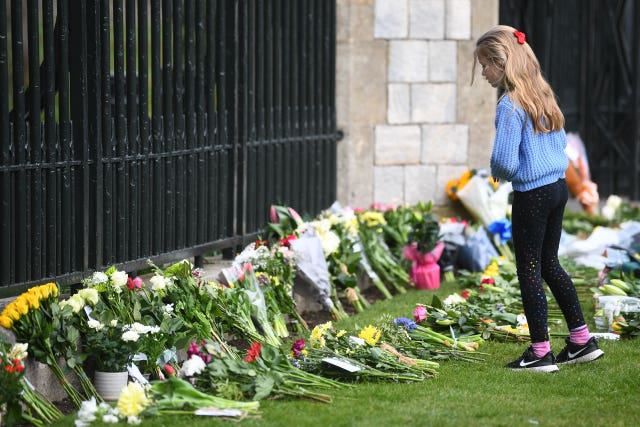 A young girl looks at flowers at Cambridge Gate at Windsor Castle, Berkshire, following the announcement of the death of the Duke of Edinburgh (Victoria Jones/PA)
A young girl looks at flowers at Cambridge Gate at Windsor Castle, Berkshire, following the announcement of the death of the Duke of Edinburgh (Victoria Jones/PA)
The monarch and the royal family will pay their respects in private, as will household staff.
Philip’s children are likely to hold a private vigil at some stage around the coffin if restrictions permit.
– Behind the scenes
The duke’s funeral was due to have a strong military presence in recognition of his naval career and his links with the armed forces.
But the prospect of creating a spectacle that could potentially attract hundreds of thousands of people means there is no longer expected to be a military procession in London or any processions through Windsor.
READ MORE: Prince Philip: BBC sets up complaints line for 'too much TV coverage'
A military involvement is expected to take place within the grounds of Windsor Castle.
Those servicemen and women taking part will rapidly begin their preparations, from practising routines to polishing helmets and swords.
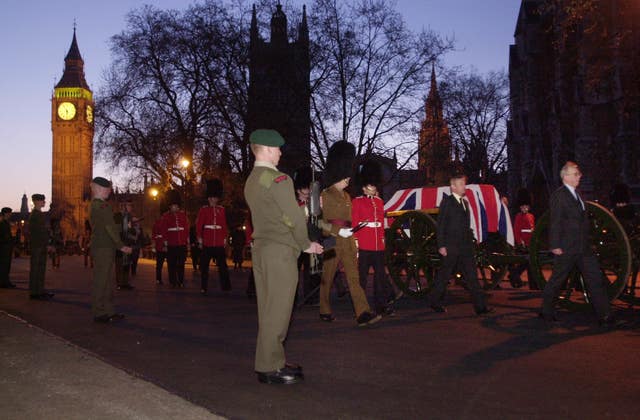 Early morning rehearsals by the military for the Queen Mother’s funeral (Stefan Rousseau/PA)
Early morning rehearsals by the military for the Queen Mother’s funeral (Stefan Rousseau/PA)
Royal dressers will be fastidiously choosing and preparing black mourning ensembles.
Thames Valley Police will be tasked with dealing with the security needed in the days ahead, and preventing mass gatherings.
– Lying in state
The duke’s coffin will not lie in state.
This has long been reported as the plan but, amid the Covid-19 pandemic, has the added benefit of freeing the Government and the royal household from a series of logistical nightmares.
The Queen Mother – the last sovereign’s consort to die – lay in state in Westminster Hall, allowing hundreds of thousands of people, who queued for hours, to file past to pay their respects.
But Philip always insisted he did not want this honour.
 The Queen Mother’s coffin lying in state in Westminster Hall (John Stillwell/PA)
The Queen Mother’s coffin lying in state in Westminster Hall (John Stillwell/PA)
– Burial
The duke is expected to be buried in the Royal Vault in St George’s Chapel on the same day as the funeral.
This interment service will be private, attended by the Queen and senior members of the royal family.
– No memorial service
In accordance with Philip’s wishes, there will be no official memorial service.
This might change, however, because of the scaled-back funeral – but only with the Queen’s agreement.



Why are you making commenting on The Herald only available to subscribers?
It should have been a safe space for informed debate, somewhere for readers to discuss issues around the biggest stories of the day, but all too often the below the line comments on most websites have become bogged down by off-topic discussions and abuse.
heraldscotland.com is tackling this problem by allowing only subscribers to comment.
We are doing this to improve the experience for our loyal readers and we believe it will reduce the ability of trolls and troublemakers, who occasionally find their way onto our site, to abuse our journalists and readers. We also hope it will help the comments section fulfil its promise as a part of Scotland's conversation with itself.
We are lucky at The Herald. We are read by an informed, educated readership who can add their knowledge and insights to our stories.
That is invaluable.
We are making the subscriber-only change to support our valued readers, who tell us they don't want the site cluttered up with irrelevant comments, untruths and abuse.
In the past, the journalist’s job was to collect and distribute information to the audience. Technology means that readers can shape a discussion. We look forward to hearing from you on heraldscotland.com
Comments & Moderation
Readers’ comments: You are personally liable for the content of any comments you upload to this website, so please act responsibly. We do not pre-moderate or monitor readers’ comments appearing on our websites, but we do post-moderate in response to complaints we receive or otherwise when a potential problem comes to our attention. You can make a complaint by using the ‘report this post’ link . We may then apply our discretion under the user terms to amend or delete comments.
Post moderation is undertaken full-time 9am-6pm on weekdays, and on a part-time basis outwith those hours.
Read the rules hereLast Updated:
Report this comment Cancel